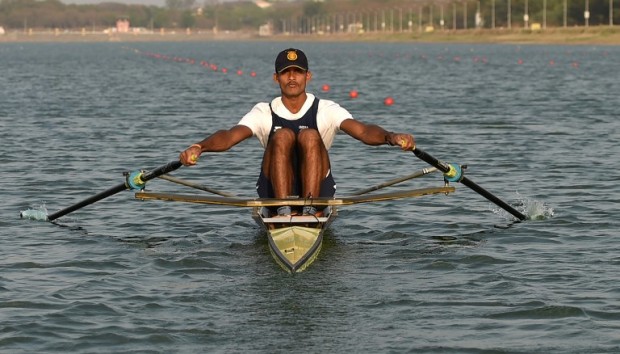Olympics: From waterless village to rowing in Rio

In this photograph taken on May 2, 2016, Indian rower Dattu Bhokanal takes part in a training session at the College of Military Engineering in Pune.
Dattu Bhokanal, a rower from a drought-stricken village in dusty western India where residents don’t have enough to drink has achieved an improbable feat — he’s qualified for the summer Olympics in Rio.
/ AFP PHOTO / INDRANIL MUKHERJEE /
An Indian rower has achieved an improbable feat by qualifying for the Rio Olympics -– despite coming from a drought-plagued village where there is not even enough water to drink.
Dattu Bhokanal, whose father dug wells for a living, said that when he took up rowing after joining the army he was scared, because he had never seen so much water.
Article continues after this advertisementBut just a few years on, and with his arid ancestral home hit by severe water shortages that have affected more than 330 million, Bhokanal is dreaming of single sculls glory as India’s only Olympic rower in Rio.
“There is a huge water shortage in our village,” said Bhokanal, referring to tiny Talegaon in Nashik district, around 165 kilometers (100 miles) northeast of Mumbai.
“We used to travel long distances to get water and also stand in long queues to get our buckets filled from water tanks,” added the 24-year-old of his childhood.
Article continues after this advertisementEarlier this month, the government said a quarter of the India’s population, spread across 10 states, had been hit by drought after two consecutive years of weak monsoons.
Bhokanal’s tale is all the more remarkable as he couldn’t even swim when he first started rowing, and also has the pressure of his mother being seriously ill in hospital.
He joined the army in 2012, needing a way to support his family after his father died from bone cancer the previous year.
Stationed in the much lusher district of Pune, he couldn’t believe his eyes when he saw a vast expanse of water where recruits practiced rowing.
At first Bhokanal was intimidated, and wondered why water was being used for sport when so many people in the farming belt were thirsty. But over time he defeated his fears.
“Eventually I got comfortable with the water and there was no looking back,” he told AFP.
Making waves
Bhokanal quickly showed skill to match his impressive, lean six-foot frame and in 2014 he competed at the Asian Games in South Korea where he finished fifth.
During regional Olympic qualifying races in April in Chungju, also in South Korea, Bhokanal made the grade for the men’s single sculls in Rio de Janeiro in August.
“It feels nice that I am bearing the fruits of my hard work,” he told AFP. “But this instant stardom does not make me any different and I will not lose the focus of my goal.”
“I am still the same person looking to get an Olympic medal,” Bhokanal said, adding that his mother’s plight has only “strengthened (his) resolve”.
He also said the hardships of Indian village life can be a good breeding ground for aspiring athletes, despite the lack of water and other resources.
“I believe that people from villages tend to work harder,” Bhokanal said.
“Farming and housework activities require a lot of physical labour and that makes us tougher. City life is much more relaxed and people tend to just enjoy themselves more,” he added.
India’s chief rowing coach Ismail Baig hailed Bhokanal’s “brilliant” dedication and down-to-earth nature.
“He was new and inexperienced but he was hungry to succeed and he worked extra hard to prove himself,” he told AFP.
“Even though he’s now in the limelight he remains a simple guy who has no airs and graces,” Baig added.